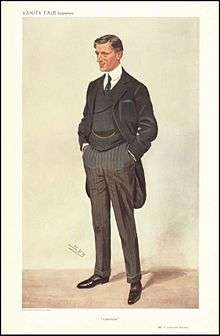Frederick Leverton Harris

Frederick Leverton Harris (17 December 1864 – 14 November 1926)[1] was a British businessman and Conservative Party politician. He sat in the House of Commons for three periods between 1900 and 1918.
His role in Parliament was largely insignificant until World War I, when he used his knowledge of shipping to play a crucial role in the United Kingdom's economic warfare against the German Empire, and joined the government in 1916 in a newly created post with specific responsibility for the blockade of Germany. As the war drew to a close, his political career looked set to flourish, but was destroyed by scandal.
Early life and family
Harris was the son of Frederick William Harris and his wife Elizabeth née Wylie, of London and Withyham, East Sussex.[2] He was educated at Winchester College and then Caius College, Cambridge, where he graduated in 1884.[2] The following year he became a partner in coal-factoring and ship-owning business of Harris & Dixon in London, and he later became a director of the National Discount Company and the Metropolitan Electricity Supply Company.[3]
In 1886 he married Gertrude Richardson, from Bessbrook, County Armagh.[2] They had no children.[3]
Political career
He was elected at the 1900 general election as the Member of Parliament (MP) Member of Parliament for Tynemouth, and supported the tariff reform campaign of his friend Joseph Chamberlain. He was appointed to the Tariff Reform Commission.
He was defeated at the 1906 election,[4] but in May 1907 he was selected as the Unionist candidate for a vacancy in the Stepney division of Tower Hamlets, in London, following the resignation of Sir William Evans-Gordon.[5]
At the by-election on 10 May, he won the seat[6] in a two-way contest with a Liberal-Labour candidate, Ben Cooper, Secretary of the Cigar Makers' Union.[7] In the same year he was elected as a Municipal Reform Party candidate to the London County Council for Stepney, and was returned to Parliament by Stepney in January 1910.[8]
For health reasons, he did not defend his seat in December 1910,[9] but he returned to Parliament 4 years later. After the death of his friend Joseph Chamberlain, his son Austen Chamberlain (whose first son was Harris's godson) resigned his East Worcestershire seat to contest his father's old seat of Birmingham West. Harris contested and won the resulting East Worcestershire by-election on 16 July,[10] just weeks before the outbreak of World War I. He then became a commercial adviser to the trade division of the Admiralty, and in 1916 moved to the Foreign Office as Director of the Restriction of Enemy Supplies Department. He became a privy councillor in January,[11] and in December he joined the government as Parliamentary Secretary to the Ministry of Blockade.
The East Worcestershire constituency was to be abolished for the 1918 general election, and Harris had been selected as the Conservative candidate for the new Moseley division of Birmingham.[12] However, he and his wife faced public criticism for their role in wartime.[12] During the war, she had visited Baron Leopold von Plessen, who was interned as an alien. Von Plessen was of British-Austrian, and his mother was a friend of Mrs Harris. She strongly denied allegations that she had ever carried him parcels or letters for him, and was supported by Austen Chamberlain, who also defended her husband against suggestions that his business had profited from his role in government.[3] However, Harris feared that the election would be fought on personal grounds, and on 16 October he withdrew his candidacy.[12] When the war ended he withdrew from public life.[3]
Retirement
Harris had lived at Camilla Lacey near Dorking in Surrey, but the house burned down in 1914. In about 1920 he took up painting, and in 1925 exhibited 50 oil paintings at the Goupil Gallery.[3]
He died suddenly on 14 November 1926 at his home in Grosvenor Street, London, aged 61.[3]
References
- ↑ Leigh Rayment's Historical List of MPs – Constituencies beginning with "W" (part 5)
- 1 2 3 Debrett's House of Commons and The Judicial Bench 1901. London: Dean and Son. 1901. p. 74. Retrieved 8 June 2014.
- 1 2 3 4 5 6 "Mr. F. Leverton Harris". The Times (44430). London, England: The Times Digital Archive. 16 November 1926. p. 16. Retrieved 8 June 2014.
- ↑ "The General Election". The Times (37920). London, England: The Times Digital Archive. 18 January 1906. p. 10. Retrieved 9 June 2014.
- ↑ "Election Intelligence". The Times (38322). London, England: The Times Digital Archive. 2 May 1907. p. 12. Retrieved 9 June 2014.
- ↑ The London Gazette: no. 28021. p. 3302. 14 May 1907. Retrieved 9 June 2014.
- ↑ "Election Intelligence". The Times (38330). London, England: The Times Digital Archive. 11 May 1907. p. 16. Retrieved 9 June 2014.
- ↑ The London Gazette: no. 28338. p. 1036. 11 February 1910. Retrieved 9 June 2014.
- ↑ "Election Intelligence". The Times (44430). London, England: The Times Digital Archive. 4 November 1910. p. 12. Retrieved 8 June 2014.
- ↑ The London Gazette: no. 28850. p. 5552. 17 July 1914. Retrieved 8 June 2014.
- ↑ The London Gazette: no. 29454. p. 1117. 28 January 1916. Retrieved 8 June 2014.
- 1 2 3 "Mr. Leverton Harris on His Office". The Times (41922). London, England: The Times Digital Archive. 16 October 1918. p. 10. Retrieved 8 June 2014.
External links
- Hansard 1803–2005: contributions in Parliament by Frederick Leverton Harris
- Portraits of Frederick Leverton Harris at the National Portrait Gallery, London

| Parliament of the United Kingdom | ||
|---|---|---|
| Preceded by Richard Sims Donkin |
Member of Parliament for Tynemouth 1900 – 1906 |
Succeeded by Herbert James Craig |
| Preceded by William Evans-Gordon |
Member of Parliament for Stepney 1907 – December 1910 |
Succeeded by William Samuel Glyn-Jones |
| Preceded by Austen Chamberlain |
Member of Parliament for East Worcestershire 1914 – 1918 |
Constituency abolished |